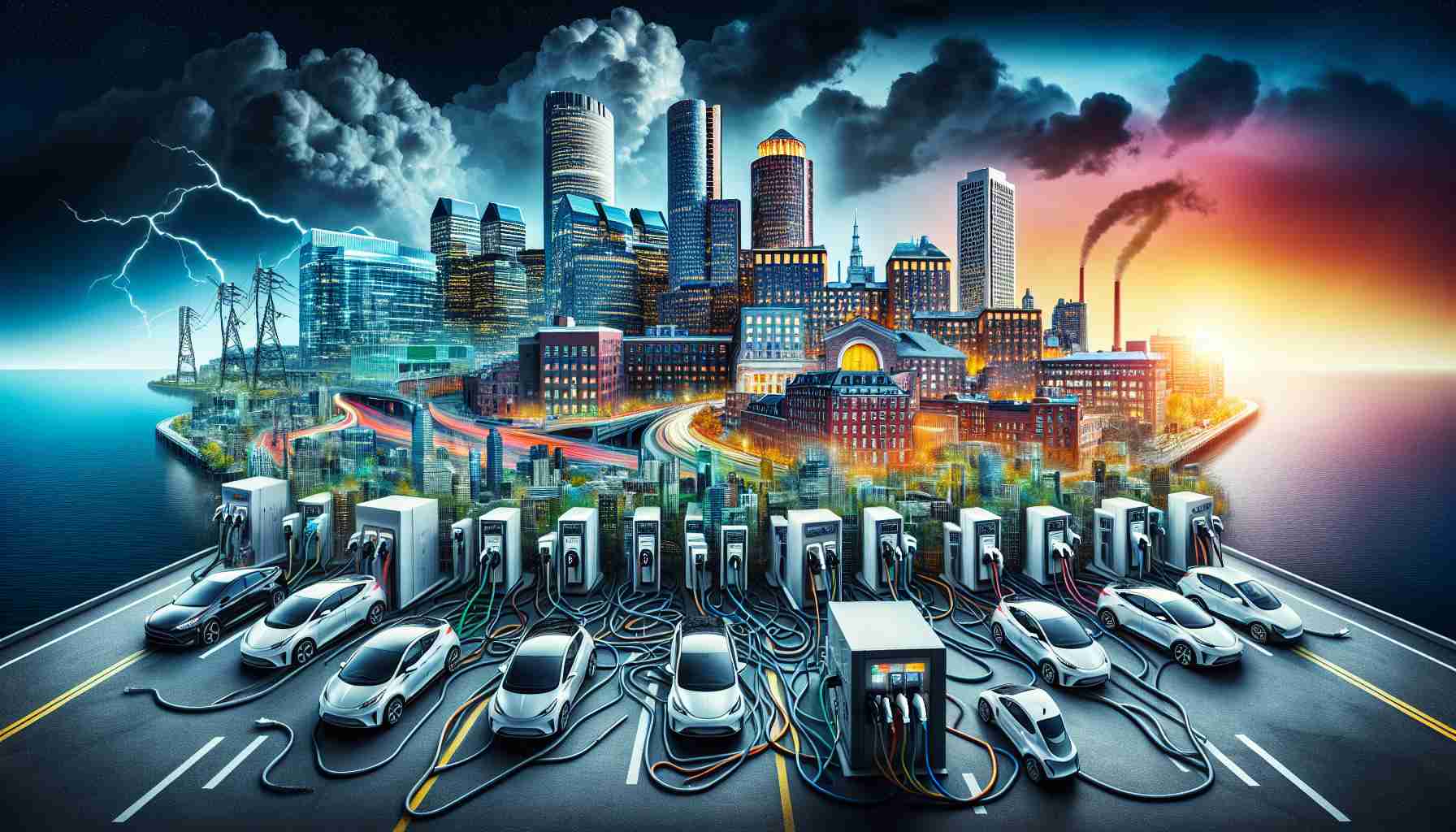Addressing the Electric Vehicle Surge
As Massachusetts pushes to have 900,000 electric vehicles (EVs) on the roads by 2030, securing funding for infrastructure seems straightforward, but implementing it has proven more difficult than anticipated. To support this ambitious goal, policy experts predict that the state will need approximately 75,000 public charging stations. Currently, only about 8,800 fast chargers are operational, highlighting the significant work that lies ahead.
Various grant programs initiated by the Department of Environmental Protection aim to encourage the development of necessary charging infrastructure. For instance, a $13 million grant initiative was supposed to fund the construction of 300 fast chargers, but the reality shows only 50 have been completed within two years. Current estimates suggest that fewer than 200 chargers may actually be constructed, leaving potentially $5 million in grant funds unclaimed as over 100 recipients opted out of utilizing their allocated funds.
Anna Vanderspek from the Green Energy Consumers Alliance emphasizes the importance of robust charging infrastructure amid these challenges. She notes that while there are 89,300 registered electric vehicles in the state, projections suggest this number could grow significantly over the next several years. Drawing parallels with California’s past growth in EV adoption, Vanderspek remains hopeful that Massachusetts can emulate this trend and meet its ambitious targets.
Understanding the Electric Vehicle Surge: Broader Implications
The surge in electric vehicle (EV) adoption in Massachusetts signifies much more than just an increase in car sales; it reflects a pivotal shift in societal norms towards sustainability and environmental responsibility. As the state endeavors to achieve its goal of 900,000 EVs by 2030, the implications for society are profound. Public sentiment is increasingly swaying towards greener choices, ultimately influencing consumers, industries, and government policies nationwide.
The global economy is also poised for significant transformation. As demand for EVs rises, so too does the need for raw materials like lithium, cobalt, and nickel essential for batteries. This surge could potentially disrupt existing supply chains, leading to price volatility in these critical sectors. In turn, this may catalyze new industries focused on sustainable mining practices, equipping economies with the frameworks to balance technological advancement with environmental stewardship.
Moreover, the environmental impact of widespread EV adoption cannot be understated. While the reduction of carbon emissions from traditional vehicles is a compelling argument for EVs, challenges connected to battery production, disposal, and the sourcing of materials remain concerning. Advances in battery technology and recycling methods will be essential to mitigate these impacts and ensure long-term sustainability.
Looking towards the future, enhanced infrastructure development and strategic funding initiatives will be critical. Investment in charging stations is not merely a logistical necessity; it reflects a broader commitment to fostering a culture of public transport accessibility and reducing our carbon footprint. If Massachusetts effectively navigates these challenges, it could very well set a precedent for other states, accelerating the push towards a greener future and establishing new standards for the automotive industry at large.
Massachusetts’ Electric Vehicle Ambitions: Overcoming Infrastructure Challenges
Addressing the Electric Vehicle Surge
As Massachusetts sets its sights on having 900,000 electric vehicles (EVs) on the roads by 2030, the need for adequate charging infrastructure becomes paramount. While funding initiatives are in place, implementation remains fraught with challenges. To realize this ambitious goal, experts estimate that the state will require around 75,000 public charging stations. Currently, Massachusetts has approximately 8,800 fast chargers operational, indicating a significant gap that needs addressing.
Current State of Charging Infrastructure
Various grant programs initiated by the Department of Environmental Protection (DEP) are aimed at bolstering the development of EV charging infrastructure. For example, a $13 million grant initiative was launched to fund the installation of 300 fast chargers. However, progress has been slow; only 50 have been installed within the past two years. Current projections suggest the state might only see the construction of fewer than 200 charging stations, with $5 million in grant funds left unclaimed as over 100 recipients declined to utilize their allocated budgets.
Importance of Robust Infrastructure
Anna Vanderspek from the Green Energy Consumers Alliance emphasizes that developing a robust charging network is crucial in overcoming these challenges. With 89,300 registered electric vehicles in the state, there’s potential for significant growth in EV adoption. Comparisons to California’s rapid increase in EV usage serve as a hopeful benchmark for Massachusetts. If the state can improve its infrastructure, it might emulate California’s success in hitting its EV targets.
Pros and Cons of Massachusetts’ EV Strategy
Pros:
– Environmental Impact: A shift to electric vehicles can significantly reduce greenhouse gas emissions.
– Job Creation: Developing charging infrastructure can create numerous job opportunities in construction and maintenance.
– Energy Independence: Increased use of electric vehicles could lead to a reduction in reliance on fossil fuels.
Cons:
– Infrastructure Lag: The slow rollout of charging stations may deter potential EV users.
– Funding Challenges: The unclaimed grant funds indicate possible inefficiencies in executing these initiatives.
– Technological Readiness: Challenges in meeting the growing demand for fast chargers may hinder the transition to electric vehicles.
Trends in EV Adoption
Electric vehicle adoption is on the rise, influenced by various factors including environmental awareness, government incentives, and advancements in technology. Experts predict EV ownership could continue to surge, particularly as battery technology improves, leading to longer ranges and decreased charging times. Additionally, states are increasingly recognizing the need for sustainable transportation solutions, giving further impetus to EV adoption.
Future Predictions for Massachusetts EV Goals
If the state can overcome its current infrastructure challenges, Massachusetts may see a surge in electric vehicle ownership, potentially exceeding the 900,000 mark by 2030. This growth, catalyzed by improved charging infrastructure and robust state policies, could serve as a model for other states looking to transition to electric vehicles.
For more information on Massachusetts’ EV initiatives and green energy policies, visit Massachusetts Government.


















